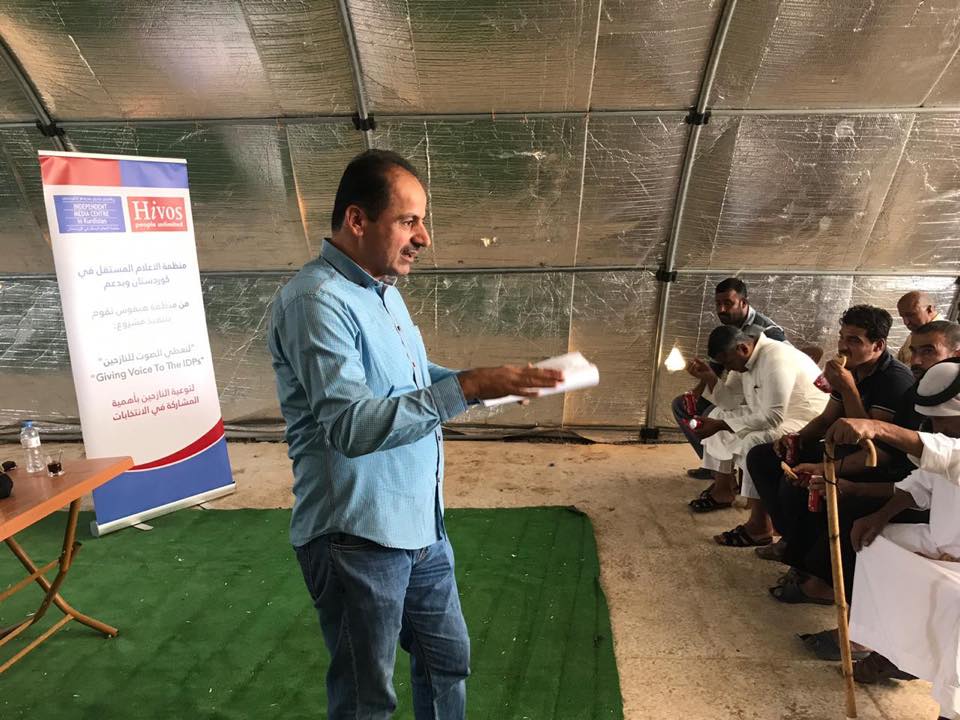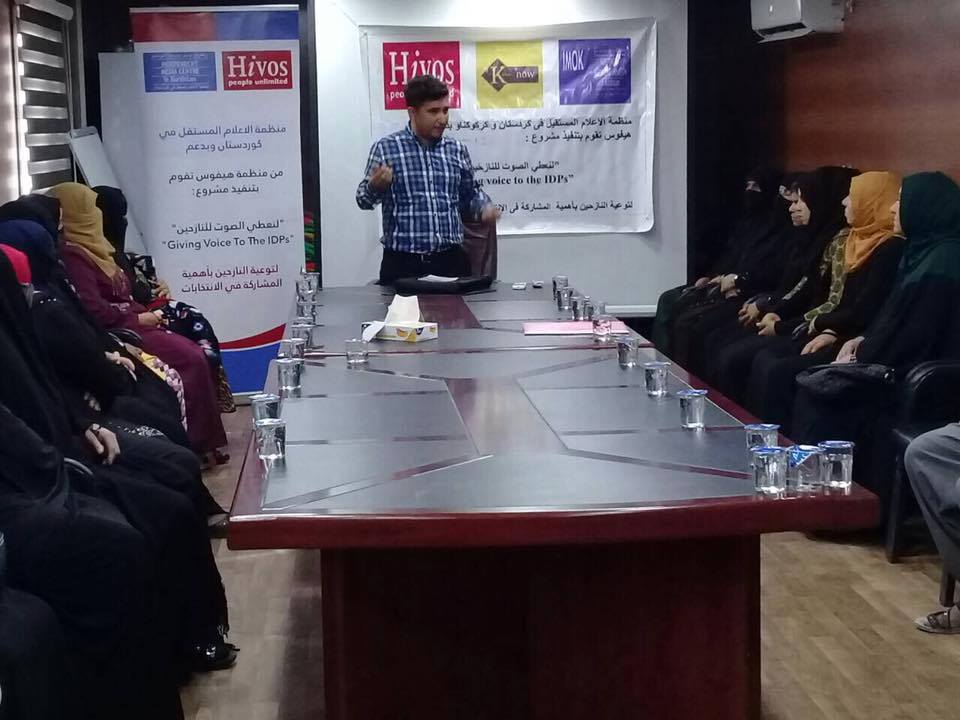“Just talk about whatever nonsense you wish except for elections” this is how the Internally Displaced Persons (IDPs) attempted to avoid listening to the Independent Media Organization in Kurdistan (IMOK) teams, when they launched their awareness-raising project in the camps during the 2018 federal elections. The IDPs said it louder; we will even exchange our votes for a sheep or mobile credit card.
Such expressions for Sarah Hassan, the team leader of the IMOK, were painful and posed real challenges to demonstrate the importance of participation in the elections to acquire the rights of minorities and women.
The ongoing project, named “Giving Voice to the IDPs”, kicked off in 2018 to increase elections awareness of the IDPs, that the Hivos, a development aid organization founded in 1968, has financially supported.
The team leader, Sara Hassan, was the first person experienced the challenges to change such perceptions of the IDPs, however, she decided to face it and could successfully overcome it, which eventually made here happy.
Hassan stepped into the camp in April 2018 and said, “the beginning was exhausting, the women did want to speak, discussing elections was annoying for them. The IDPs were frustrated with the lack of solutions for their problems and their inability to return to their places of origin.”
“Please do not sell your votes for money, you can have influence in the parliament and elect your representatives,” Hassan told the IDPs.
Please do not sell your votes for money, you can have influence in the parliament and elect your representatives
The 24-month long project resulted from the mass displacement of one million and 300 thousand Iraqi citizens due to the surge of violence between the armed groups and the government forces. Nearly 800 thousands IDPs still reside in the Kurdistan Region.
The aim of the project was to deliver the unheard voice of the IDPs especially during the 2018 federal elections and later the provincial council elections, which is yet to take place.
One of the primary obstacles that Hassan’s teams faced was the marginalization of the IDPs in the political decision-making process. Simultaneously, a huge disagreement emerged over the voters list as well as the participation of the IDPs in the elections in the places of displacement, raising the fear that their votes might alter the results of the host community elections.
Another important barrier was that the IDPs lacked a leadership working to deliver the miseries of the IDPs. Establishing the ground for such leadership was the duty of the IMOK teams.
The nomination of women and minorities as electoral candidates to take part in the decision-making process was challenged by the societal norms and traditions.
“We informed women and girls about the importance of becoming their own representatives and that each of their vote can result in meaningful changes,” Hassan said.
We informed women and girls about the importance of becoming their own representatives
Sara Hassan, 36, is also a victim of instability and became displaced in 2014, which helped her as the team leader to intenerate with the IDPs.
The project has three main objectives, which include that “IDPs are aware of and can exercise their active voting rights in the areas of displacement, IDPs, in particular women and minorities, have the capacities and motivation to take up leadership roles in communities and politics, and oolitical parties and community leaders promote an approach of non-violence during elections.”

Duhok, a member of IMOK team is raising awareness of elections, May 2015. Photo: IMOK
The IMOK teams divided the IDPs into groups and gave them awareness sessions to at least IDPs of 10 camps in Duhok and other camps in Sulaymaniyah, and Erbil. The the group members exchanged their perceptions on the matters related to elections.
Sara added that, “before the beginning of the project, I was always among the IDPs, I knew they were highly disappointed and believed that elections would not change their situations. Consequently, some of the IDPs sold their votes, which was a big violation.”
I knew they were highly disappointed and believed that elections would not change their situations
“Some of them sold their votes in return for an animal or a mobile credit card. The IDP men said that the women should not vote, which was a challenge to women to exercise their electoral right.”
Sara further added that,“many topics were discussed during the sessions, they asked questions about the importance of participation in the elections and shared their beliefs. Eventually, many of them grasped the idea to vote in the elections.”
KirkukNow, however, revealed that nearly half of the 450 thousand eligible IDP voters were unbale to cast their votes in the 2018 federal elections, while the turnout at the camps where Sara’s teams provided trainings was pleasing.
98 per cent of the IDPs at the Essyan camp, that received tens of session of the IMOK, participated in the elections, according to a data of the oganization.

Sulaymaniyah, a team of IMOK explain the importance of elections and right of women to numerous female IDPs, May 2018. Photo: IMOK
The Ezidis, most of whom attended the sessions of the project, won three parliamentary seats, including a woman representative, while they are only allocated a quota seat based on the electoral laws.
Shadi Hassan, the program officer at IMOK, told KirkukNow that they conducted 21 meetings with the IDPs, in which more than five thousands of them were present.
IMOK also told KirkukNow that, “the electoral commission in Duhok informed them Giving Voice to the IDPs project was the only awareness raising project during the 2018 federal elections, that greatly benefit the target group of the project.”
The electoral commission in Duhok informed them Giving Voice to the IDPs project was the only awareness raising project during the 2018 federal elections
“Some of the session attendees changed their mind after the sessions and said they will vote for the women candidates, not only the men.”





